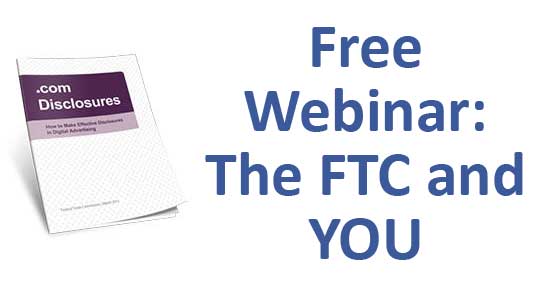 One of the most important and yet least understood issues in Affiliate Marketing right now is FTC compliance. In large part it is because the FTC continues to issue only “Guidelines” and “Settlements” and not really specific directives. But that is, for the most part, how the FTC operates. The FTC issues Guides that are “interpretations” of laws. In this case, they are are interpretations of Section 5(a) of the FTC Act prohibiting unfair or deceptive practices in commerce. Basically–false or deceptive advertising.
One of the most important and yet least understood issues in Affiliate Marketing right now is FTC compliance. In large part it is because the FTC continues to issue only “Guidelines” and “Settlements” and not really specific directives. But that is, for the most part, how the FTC operates. The FTC issues Guides that are “interpretations” of laws. In this case, they are are interpretations of Section 5(a) of the FTC Act prohibiting unfair or deceptive practices in commerce. Basically–false or deceptive advertising.
That’s where affiliate marketing comes into play. By virtue of making money off of our sites and social media accounts or reviewing free products, we fall under this law and these Guidelines.
Last year when the new .com Disclosures were released, I wrote about how they applied to affiliates (Affiliates Take Note: New FTC Disclosure Guidelines). Since then I have written and spoken about them several times and continue to receive many questions. While I can’t tell you definitively what you should be doing, I can tell you what the FTC has said, how others are interpreting it, and what some best practices are.
On April 8, 2014, I will be conducting a free webinar with ShareASale titled “The FTC and You!” You can sign up through their site, and spots are limited.
Here are some of the things that I will be covering:
- How the FTC Guidelines apply to affiliates
- Revised Endorsement Guidelines and .com Disclosures
- Is a “Disclosure” link or button sufficient?
- Top v. bottom of blog post disclosure
- Disclosure on Twitter and Facebook
- Specific examples from the FTC and other sites
- Monitoring and enforcing disclosure in affiliate programs
Whether you are a blogger reviewing free products, an affiliate marketer, an OPM, or a merchant, you need to understand how the Guidelines apply to you. If you have any questions in advance of the webinar, let me know and I will try to work them in!
(**Disclosure about disclosure–I’m an attorney, but I am not YOUR attorney. What I say should be taken only as legal information and not legal advice. If you believe you might be in violation, contact counsel for assistance.)
Please help me spread the word about this webinar. So many people need this information and do not even realize it.
Plus: If you want to stay in the “know” about issues like this, 1) be sure to sign up for my newsletter (right sidebar), and 2) follow me on Twitter and Google+.